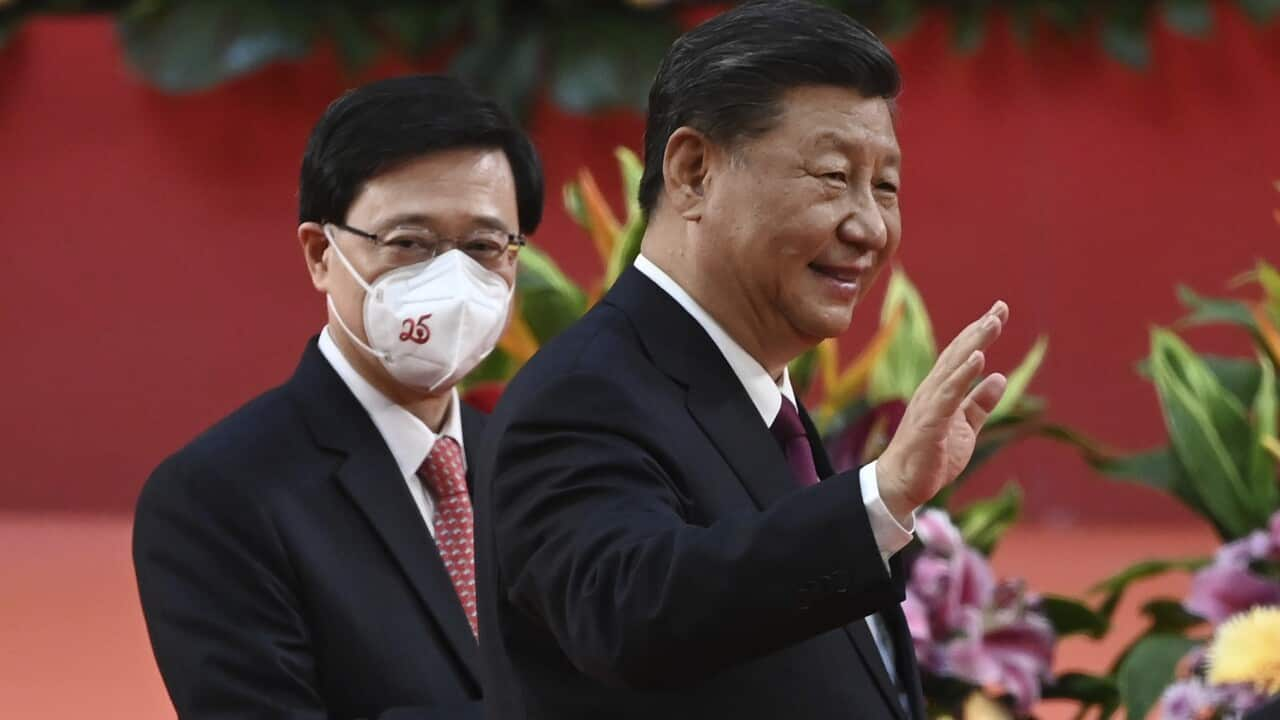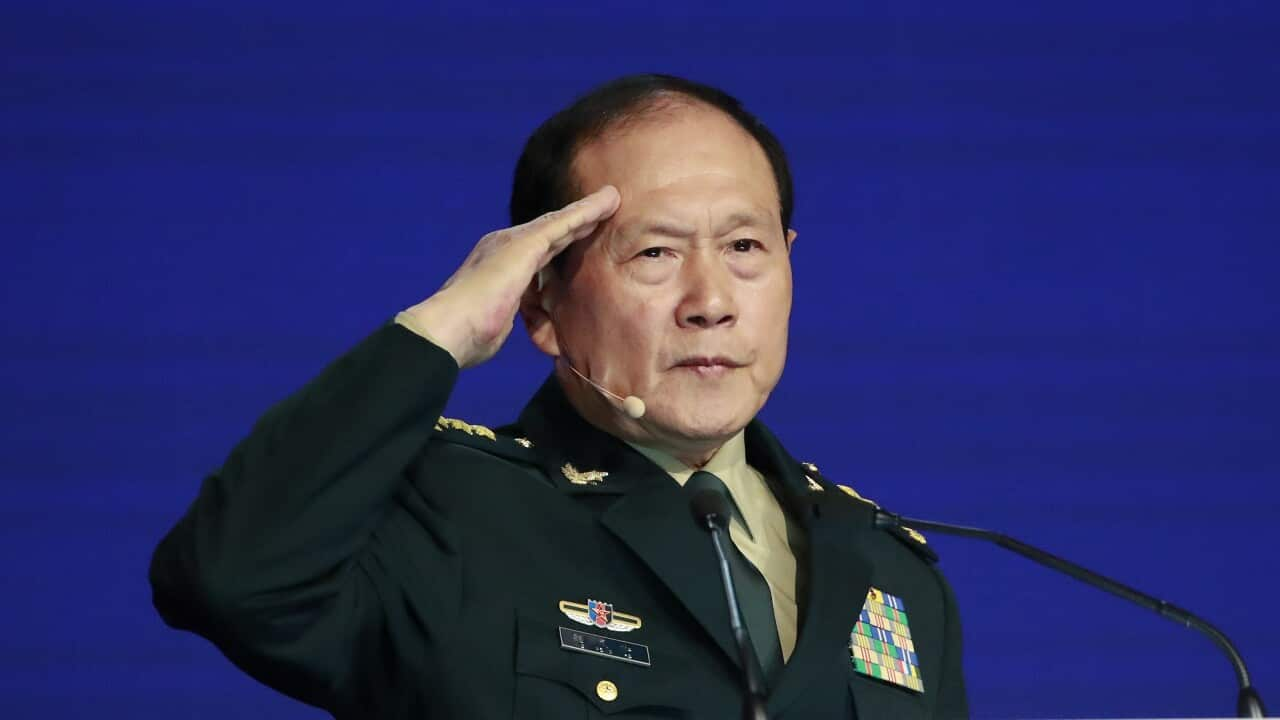Key Points
- China's president says there is no reason to change Hong Kong's "one country, two systems" formula of governance.
- But critics have accused authorities of trampling on those freedoms it promised.
There is no reason to change Hong Kong's "one country, two systems" formula of governance, Chinese President Xi Jinping said on a rare visit to the global financial hub after swearing in the city's new leader, John Lee.
The United Kingdom returned Hong Kong to Chinese rule on 1 July, 1997, with Beijing promising wide-ranging autonomy, unfettered individual rights and judicial independence at least until 2047.
China's critics accuse authorities of trampling on those freedoms, unavailable on the authoritarian mainland, with a sweeping national security law imposed by Beijing on the city in 2020 after mass pro-democracy protests the year before.
UK Prime Minister Boris Johnson and United States Secretary of State Antony Blinken said on Thursday that China had failed to meet its handover commitments.
China and Hong Kong reject the accusations, saying the law "restored order from chaos" so that the city could prosper.
Mr Xi said the "one country, two systems" formula was successful under China's "comprehensive jurisdiction."
"For this kind of good system, there is no reason at all to change it. It must be maintained over the long term," Xi said.
"After experiencing wind and rain, everyone can painfully feel that Hong Kong cannot be chaotic, and must not become chaotic again ... Hong Kong’s development cannot be delayed again, and any interference must be eliminated."
Mr Xi added China would support Hong Kong's role as an international finance and trade hub.
At the swearing-in ceremonies on Friday, all officials, including Mr Xi, wore masks and did not shake hands.
Former police officer Lee, sanctioned by Washington over his role in implementing the security law, takes charge as the city is facing an exodus of people and talent amid some of the toughest COVID-19 restrictions in the world.
Authorities deployed a massive security force, blocking roads and the airspace around the picturesque Victoria Harbour, where the last colonial governor, Chris Patten, tearfully handed Hong Kong back to China at a rain-drenched ceremony in 1997.
Red lanterns, Chinese and Hong Kong flags, and posters declaring a "new era" of stability decorated districts across the city.
Mr Xi did not attend the traditional flag-raising ceremonies on Friday, with media reporting he stayed overnight across the border in Shenzhen after arriving in Hong Kong on Thursday.
Mr Xi's visit to Hong Kong is his first since 2017, when he swore in outgoing leader Carrie Lam and stayed in the city for the duration of his trip. His overnight whereabouts this time, and the reasons why he may have chosen Shenzhen, have not been officially confirmed.
Hong Kong recorded more than 2,000 daily COVID-19 cases on Thursday, levels which would prompt tight restrictions in any mainland city. China is alone among major countries in choosing to eliminate outbreaks as soon as they occur, at all costs.

At the swearing-in ceremonies on, all officials, including Chinese President Xi Jinping, wore masks and did not shake hands. Source: AAP, AP / Ju Peng
Hong Kong's freedom has vanished, Taiwan says
Freedom in Hong Kong has 'vanished' and China has failed to live up to its promises of 50 years without change, Taiwan Premier Su Tseng-chang.
Speaking to reporters in Taipei, Ms Su said promises that life would go on as normal for Hong Kong after the handover, had not been kept.
"It's only been 25 years, and in the past, the promise was 50 years of no change. The 'dancing will go on and horses still run' has disappeared, and even freedom and democracy have vanished," he said, referring to a Hong Kong expression about how life would not change under Chinese rule.
"We also know that we must hold fast to Taiwan's sovereignty, freedom and democracy," Ms Su said.
"China's so-called 'one country, two systems' has simply not stood up to the test."
Australia 'deeply concerned' over rights
Australia criticised China for curbing the rights and freedoms of people in Hong Kong on the 25th anniversary of the United Kingdom's handover to China.
"Australia remains deeply concerned by the continuing erosion of Hong Kong's rights, freedoms and autonomy, two years since the imposition of the National Security Law," Foreign Minister Penny Wong said in a statement.
The 2020 security law, imposed after huge protests in 2019, criminalised subversion, secession, terrorism and collusion with foreign forces.
Senator Wong said the law had been applied broadly to arrest or pressure pro-democracy figures, opposition groups, the media, trade unions and civil society.
UK 'not giving up' on Hong Kong
Mr Johnson said on Thursday that the UK was "not giving up on Hong Kong" and accused Beijing of failing to keep its promises.
"We made a promise to the territory and its people and we intend to keep it, doing all we can to hold China to its commitments," Johnson said in a video message posted on Twitter.
"We simply cannot avoid the fact that for some time now, Beijing has been failing to comply with its obligations," he added.
"It's a state of affairs that threatens both the rights and freedoms of Hong Kongers and the continued progress and prosperity of their home."
US blasts 'erosion of autonomy' in Hong Kong
Mr Blinken on Thursday expressed Washington's solidarity with the people of Hong Kong as they experience what he called an "erosion of autonomy" under Chinese rule, and called for their personal freedoms to be restored.
"It is now evident that Hong Kong and Beijing authorities no longer view democratic participation, fundamental freedoms, and an independent media as part of the One Country, Two Systems governance model agreed by the UK and China at the time of the handover in 1997," Mr Blinken said in a statement.
"We stand in solidarity with people in Hong Kong and reinforce their calls for their promised freedoms to be reinstated."












